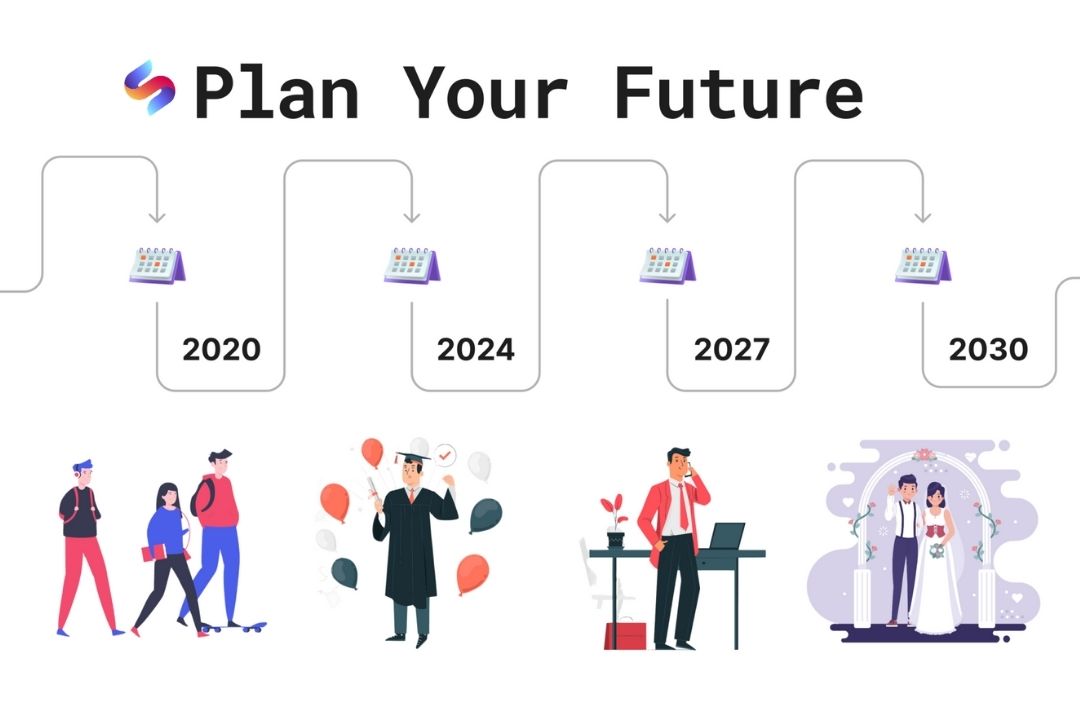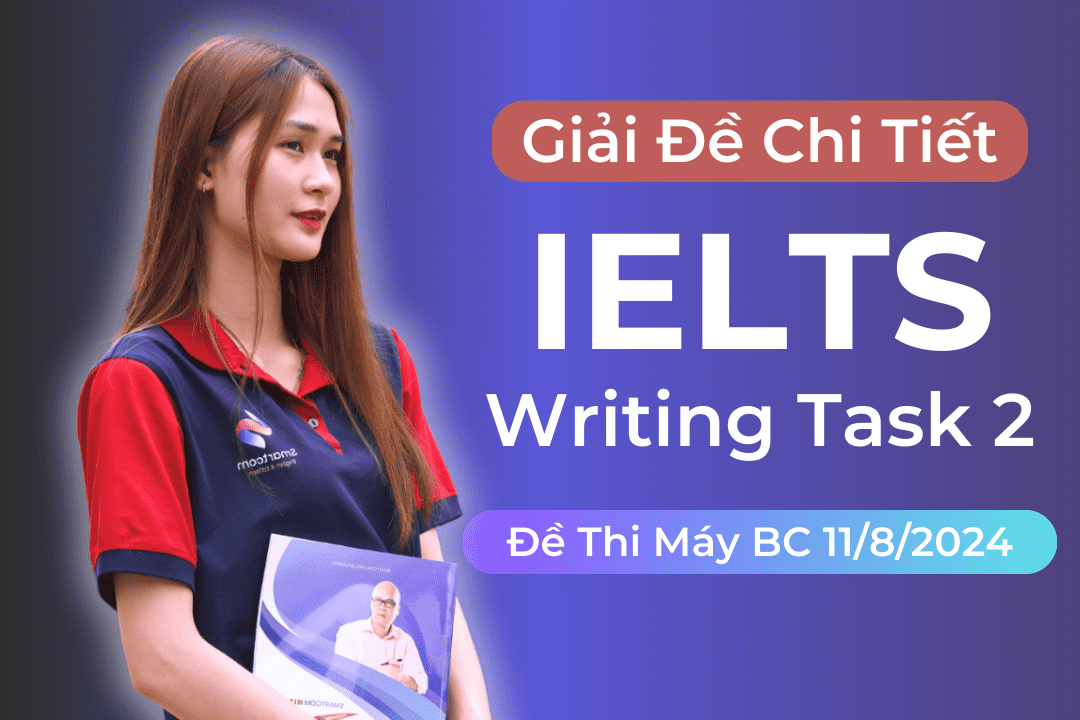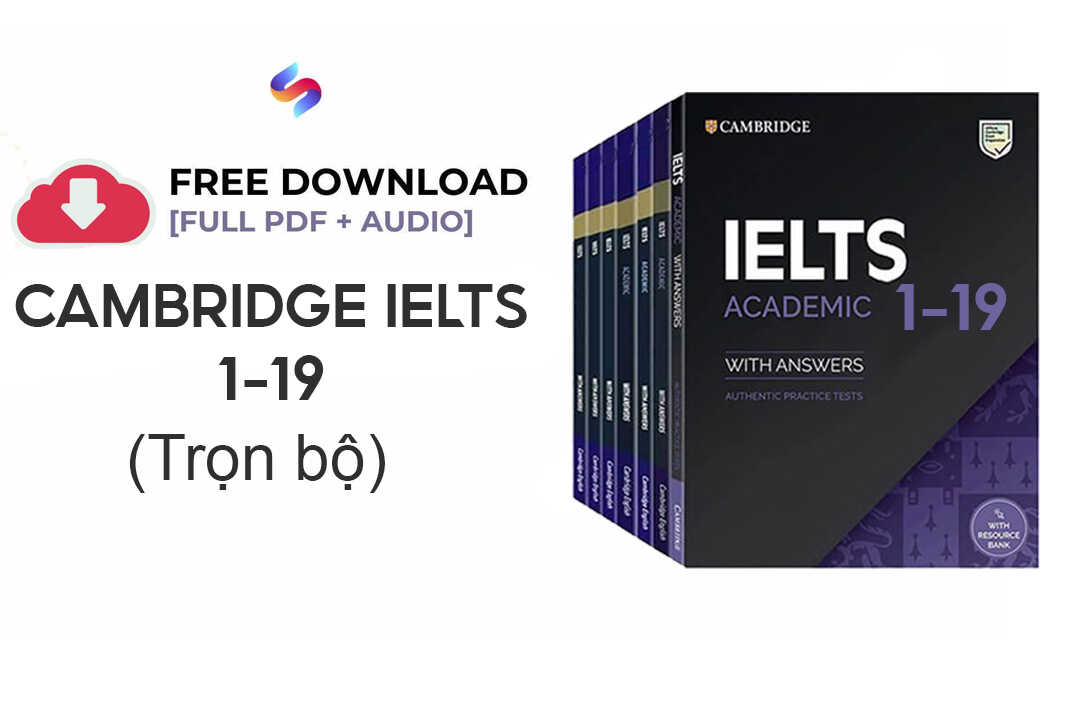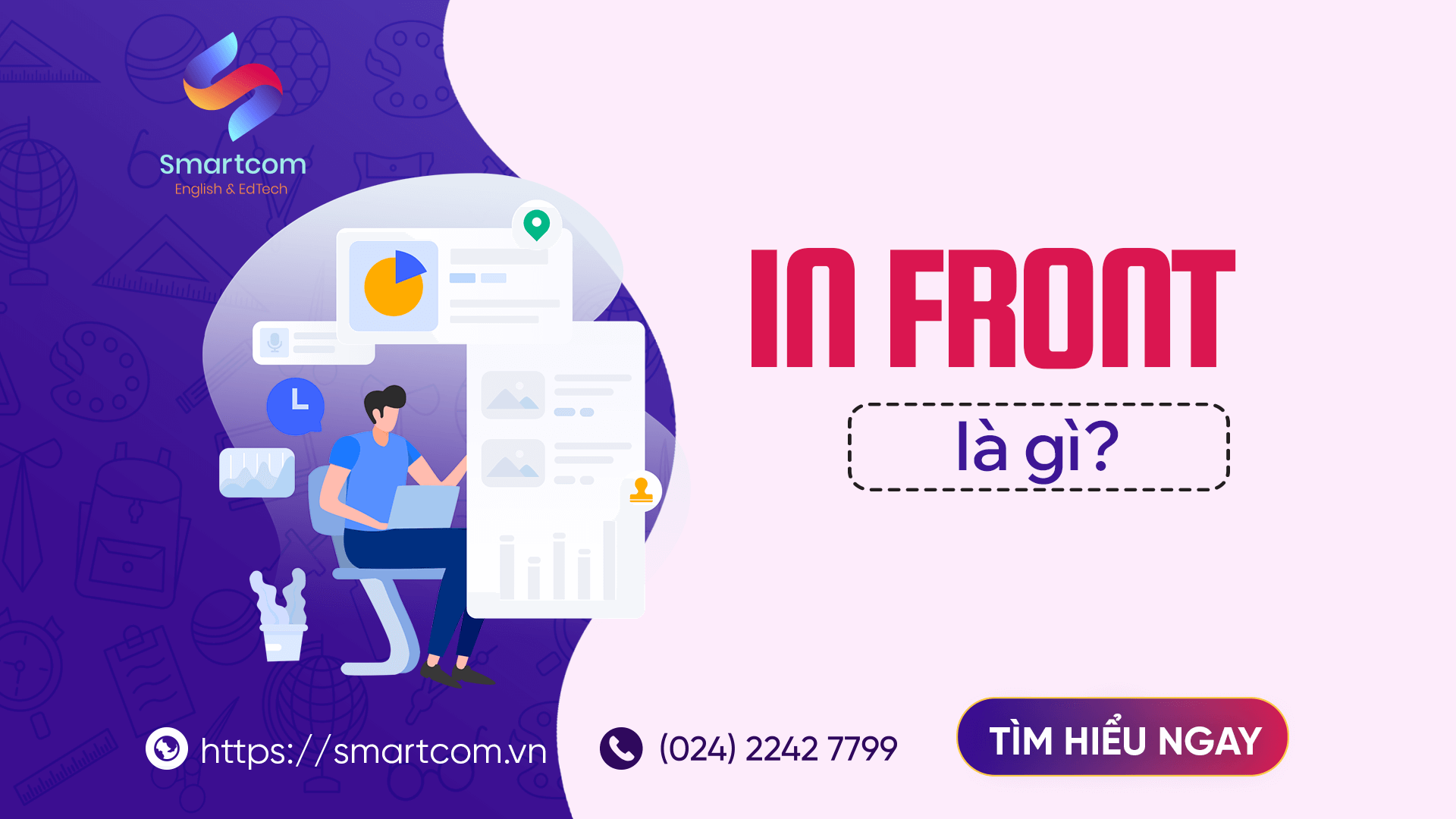Đội ngũ chuyên gia tại Smartcom English là tập hợp những chuyên gia đầu ngành trong lĩnh vực IELTS nói riêng và tiếng Anh nói chung. Với phương pháp giảng dạy sáng tạo, kết hợp với công nghệ AI, chúng tôi mang đến những trải nghiệm học tập độc đáo và hiệu quả. Mục tiêu lớn nhất của Smartcom Team là xây dựng một thế hệ trẻ tự tin, làm chủ ngôn ngữ và sẵn sàng vươn ra thế giới.
Some people think that planning for the future is a waste of time. They believe it is more important to focus on the present. To what extent do you agree or disagree?
Đề IELTS Writing task 2, thi máy BC ngày 11/8/2024

Tổng quan dạng bài
“Agree or disagree” là dạng đề phổ biến gần đây trong các bài thi Actual Test của IELTS, yêu cầu người viết thể hiện rõ ràng quan điểm của mình, đồng ý hoặc không đồng ý với một ý kiến, và đưa ra các lý do, ví dụ cụ thể để hỗ trợ cho quan điểm đó. Vì vậy người viết phải có kiến thức về xã hội và sự mạch lạc, lập luận chặt chẽ và cần bám sát vào một phía của vấn đề (hoàn toàn đồng ý, không đồng ý, hoặc cân bằng cả hai).
Đề bài lần này nói về một vấn đề đang được bàn luận khá nhiều gần đây, đó là liệu “lên kế hoạch cho tương lai có phải là lãng phí thời gian” hay không. Phải nói rằng đây là một chủ đề khó, yêu cầu người viết phải có am hiểu rất sâu sắc về kiến thức xã hội để có thể đưa ra các ví dụ từ đời sống hoặc câu chuyện thành công/thất bại khi lập kế hoạch cho tương lai để làm rõ quan điểm. Hãy cùng phân tích đề bài một cách kĩ lưỡng hơn nhé!
Phân tích đề bài
“Một số người cho rằng lập kế hoạch cho tương lai là lãng phí thời gian. Họ tin rằng tập trung vào hiện tại quan trọng hơn. Bạn đồng ý hay không đồng ý ở mức độ nào?”
Đề bài yêu cầu bạn không chỉ đưa ra ý kiến cá nhân mà còn phải phát triển ý tưởng rõ ràng, có luận điểm và ví dụ cụ thể. Bạn cần cân nhắc về tầm quan trọng của cả hiện tại và tương lai trong cuộc sống, đồng thời đưa ra các dẫn chứng thực tế. Đề bài này phù hợp để đánh giá khả năng phân tích sâu sắc của thí sinh, vì nó không chỉ đòi hỏi khả năng trình bày ý kiến cá nhân mà còn yêu cầu giải thích, so sánh, và thảo luận về sự cân bằng giữa hai quan điểm này.
Cấu trúc bài viết thường theo hướng:
- Introduction: Giới thiệu ý kiến và quan điểm của người viết (đồng ý hoặc không đồng ý).
- Body paragraphs: Phát triển luận điểm với lý do và ví dụ minh hoạ.
- Conclusion: Tóm tắt quan điểm và nhấn mạnh lại lý do.
Hãy cùng xem những ý tưởng bên dưới nha.
Agree with the statement:
- Uncertainty of the future:
- The future is unpredictable, and long-term plans can easily be disrupted by unforeseen events (e.g., pandemics, economic downturns).
- Focusing on the present allows one to adapt and respond effectively to immediate challenges.
- Maximizing opportunities in the present:
- Living in the present helps seize opportunities as they arise, which might be missed if one is too focused on future goals.
- It encourages flexibility and spontaneity, allowing people to make the most out of current situations.
- Mental well-being:
- Constantly worrying about the future can lead to stress and anxiety.
- Living in the moment fosters mindfulness and reduces unnecessary pressure.
- Uncertainty of life’s length:
- There’s no guarantee of how long we will live, so it is more practical to make the most of the present instead of over-planning for an uncertain future.
Disagree with the statement:
- Importance of setting long-term goals:
- Without planning, individuals risk drifting without direction or purpose, making it difficult to achieve meaningful long-term goals such as career success, financial stability, or personal development.
- Planning helps break down long-term objectives into manageable steps.
- Preparedness for unexpected situations:
- Planning ensures that individuals are prepared for future challenges, such as retirement, healthcare needs, or financial emergencies.
- It provides a sense of security and reduces risks.
- Balanced decision-making:
- When people only focus on the present, they may make impulsive decisions that negatively affect their future (e.g., overspending, neglecting education).
- A well-thought-out plan allows for better judgment and strategic actions.
- Successful individuals and organizations plan:
- Most successful people and organizations achieve their status through careful long-term planning (e.g., entrepreneurs, governments, investors).
- Strategic foresight is key to sustained success.
Balanced approach (middle ground):
- Living in the present while planning for the future:
- A balanced approach ensures that individuals can enjoy the present while still having a sense of direction for the future.
- Short-term flexibility combined with long-term goals allows for both personal satisfaction and preparedness.
- Adaptable planning:
- Future planning doesn’t have to be rigid; it can be flexible and adaptable based on current circumstances, allowing for changes as needed.
- This approach blends both present focus and future orientation effectively.
Ta có thể thấy cả “Chuẩn bị tốt cho tương lai” lẫn “Sống trọn vẹn cho hiện tại” đều có những ưu điểm khó có thể bỏ qua, vì vậy cách làm tốt nhất cho bài văn này là “Balanced Approach” đồng ý một phần với cả hai quan điểm. Bạn có thể cho rằng mặc dù việc tập trung vào hiện tại là quan trọng để nắm bắt cơ hội, nhưng cũng không thể bỏ qua việc chuẩn bị cho tương lai. Sự cân bằng giữa hiện tại và tương lai mới là lý tưởng.
Bài giải đề IELTS Writing task 2 thi máy BC ngày 11/8/2024

BÀI LÀM: (297 WORDS – BAND 8.5)
Some individuals argue that planning for the future is unnecessary, and it is more important to concentrate on the present. While focusing on the present has its merits, I believe that planning for the future is crucial for long-term success and stability.
Firstly, planning for the future provides direction and purpose. People with clear goals and plans tend to make better decisions in the present, knowing how their actions align with their long-term objectives. For example, saving money or investing in education is not immediately gratifying, but it leads to financial security and better career opportunities in the future. Without a plan, individuals may act impulsively, which could lead to missed opportunities or unnecessary risks.
Secondly, future planning allows individuals to anticipate potential challenges and prepare accordingly. Life is unpredictable, and without a plan, people may struggle to cope with unforeseen circumstances. Planning helps individuals build resilience and flexibility, ensuring that they are better equipped to handle setbacks. For instance, setting aside emergency funds or having a retirement plan can alleviate stress and ensure stability in uncertain times.
However, focusing solely on the future without appreciating the present can lead to dissatisfaction. It is important to find a balance, where one enjoys the present moment while being mindful of future goals. Living too much in the present without considering future consequences may result in short-term pleasures at the expense of long-term well-being.
In conclusion, while focusing on the present is important, planning for the future is essential for making informed decisions and ensuring long-term security. A balanced approach, where one plans for the future while enjoying the present, is the most effective strategy for a fulfilling and stable life.
Từ vựng cần nhớ
- unnecessary /ʌnˈnɛsɪsəri/ (adjective) – Không cần thiết
- concentrate /ˈkɒnsəntreɪt/ (verb) – Tập trung
- merit /ˈmɛrɪt/ (noun) – Giá trị, ưu điểm
- crucial /ˈkruːʃəl/ (adjective) – Quan trọng, cốt yếu
- gratifying /ˈɡrætɪfaɪɪŋ/ (adjective) – Làm hài lòng, thỏa mãn
- impulsively /ɪmˈpʌlsɪvli/ (adverb) – Một cách bốc đồng
- anticipate /ænˈtɪsɪpeɪt/ (verb) – Dự đoán, lường trước
- resilience /rɪˈzɪliəns/ (noun) – Sự kiên cường, khả năng phục hồi
- flexibility /ˌflɛksɪˈbɪlɪti/ (noun) – Sự linh hoạt
- setback /ˈsɛtbæk/ (noun) – Sự thất bại, trở ngại
- alleviate /əˈliːvieɪt/ (verb) – Làm giảm bớt, làm dịu đi
- dissatisfaction /dɪsˌsætɪsˈfækʃən/ (noun) – Sự không hài lòng
- appreciating /əˈpriːʃieɪtɪŋ/ (verb) – Đánh giá cao, trân trọng
- consequences /ˈkɒnsɪkwənsɪz/ (noun) – Hậu quả
- fulfilling /fʊlˈfɪlɪŋ/ (adjective) – Thỏa mãn, mang lại niềm vui
Xem thêm:
- Giải đề IELTS Writing task 2 thi trên máy BC ngày 18/9/2024 (Bài luận chủ đề có nên thi bằng lái xe đạp)
- Chi phí học IELTS
- Học IELTS ở đâu tốt
Trên đây là bài phân tích và giải đề IELTS Writing task 2 thi máy BC ngày 11/8/2024. Hy vọng bài viết giúp ích bạn trong quá trình ôn luyện, chúc các bạn thi tốt!
Nếu bạn loay hoay mãi vì chưa biết học IELTS ở đâu tốt và băn khoăn về chi phí học IELTS? Đừng lo, Smartcom English có đầy đủ giải pháp với lộ trình cá nhân hóa cho từng học viên, hiệu quả và tiết kiệm.
By: Smartcom English – IELTS experts
Kết nối với mình qua
Bài viết khác


![[PDF + Audio] Tải Sách IELTS Cambridge 19 (Kèm đáp án)](https://smartcom.vn/blog/wp-content/uploads/2024/06/ielts-cambridge-19_optimized.png)


![[PDF + Audio] Tải Sách IELTS Cambridge 17 (Kèm đáp án)](https://smartcom.vn/blog/wp-content/uploads/2024/07/sach-ielts-cambridge-17_optimized.jpg)

![[PDF + Audio] Tải Sách IELTS Cambridge 15 (Kèm đáp án)](https://smartcom.vn/blog/wp-content/uploads/2024/07/ielts-cambridge-15_optimized.jpg)








